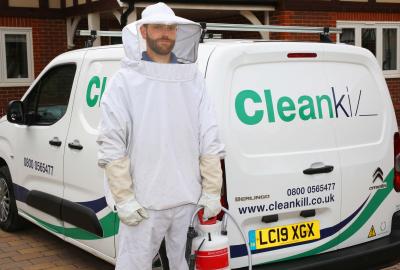You can probably count on one hand the number of wasps you have seen this summer which is good news for people who have a phobia of wasps, but not such good news for pest controllers who usually benefit from the extra business wasp nest removals brings in.
Spheksophobia – the persistent fear of wasps - is one of the more common phobias. The word is derived from Greek spheco meaning wasps and Phobos the ‘Greek God of fear’ or dread.
People with Spheksophobia experience extreme panic attacks at the sight or even thought of wasps. As a result, they go into a “flight or fight” mode which is nature’s way of preparing the body for danger. The fear may become so severe that anxiety about being stung can cause people to cancel invitations to outside social events and to keep their doors and windows closed on warm days.
Cleankill Pest Control has seen call outs to deal with wasp nests drop in 2024 by over 50 percent compared to 2023.
Experts believe that the wet Spring may have been to blame as there were fewer aphids for wasps to feed on. Cleankill Managing Director Paul Bates reminds us “not to get too excited over wasp-free picnics this year” as over his 40-plus years as a pest controller he has seen wasp populations fluctuate from year to year and they are likely to quickly recover next year. “We had a similar situation in 2012 which was caused by a few different things coinciding such as wet weather and soft fruit crops failing.”
“Wasp behaviour changes in late summer and they become much more aggressive due to their craving for sweet substances. This happens when they stop feeding the wasp larvae and are basically jobless. While they are bringing food such as greenfly/aphids for the larvae to feed on, they get a sweet reward from the skin of the larvae. But once the larvae have hatched, they stop getting their sugary treats and start looking around for other sugary substances to fulfil their craving. This is when they become a real nuisance.”
Despite the bad press, wasps are very important pollinators and beneficial to our ecosystem. So, if their location is not likely to present any real risk to humans, then probably best to just leave them alone. However, if they are entering your home and especially if a family member is allergic to stings, then it is wise to have the nest professionally dealt with.
Wasps are hunters, usually of other insects, because their offspring require meat to develop into adults. This makes them very efficient natural pest controllers for insect pests in gardens like caterpillars, aphids and weevils. Adult wasps may be hunters, but they do not eat the meat themselves. They find nutrition from nectar in flowers and, in doing so, they carry pollen from flower to flower.
Many small pest control companies rely on income from wasp call outs and have seen their profits severely dented this year. Larger companies like Cleankill Pest Control that mainly focus on business-to-business and facilities management contracts have not been affected as much.
Paul added: “This year has been a real contrast with last year. It’s good news for people who are allergic to wasps, but I do feel sorry for the smaller companies, some of which might struggle to stay in business because of the low wasp numbers this year.
“If we start to get some hot conditions at the end of the summer then people will start to see more wasps appearing.”
Cleankill has been solving pest problems for commercial and domestic customers for more than 30 years. Using the most up-to-date pest-control techniques and technology, the company keeps its customers pest free and makes sure it is at the forefront of the industry when it comes to the use of pesticides and non-toxic pest control methodology. www.cleankill.co.uk
